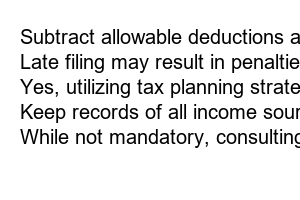종합소득세 대상자
Subject to Comprehensive Income Tax: A Guide for Taxpayers
Are you familiar with the term “subject to comprehensive income tax”? If not, don’t worry! In this blog post, we will break down the concept of comprehensive income tax and its implications for taxpayers. Whether you are a working professional, a business owner, or simply curious about tax matters, this article will provide valuable information to help you understand this important aspect of taxation.
1. What is Comprehensive Income Tax?
Comprehensive income tax is a type of taxation method that applies to individuals and businesses. It encompasses all sources of income, including wages, salaries, investments, and profits from business activities. Unlike other tax systems that focus on specific types of income, comprehensive income tax takes into account all forms of earnings.
2. Understanding Taxable Income
Under comprehensive income tax, individuals and businesses will need to calculate their taxable income. This is done by subtracting allowable deductions and exemptions from their total income. Allowable deductions may include expenses related to the production of income, such as business expenses or mortgage interest payments. Exemptions, on the other hand, are specific amounts that are subtracted from the total income, reducing the tax liability.
3. Progressive Tax Rates
Comprehensive income tax is based on a progressive tax rate system. This means that individuals and businesses with higher incomes will be subject to a higher tax rate, while those with lower incomes will pay a lower rate. The progressive tax rates aim to distribute the tax burden more fairly, with the principle that those who earn more should contribute more to society.
4. Filing Obligations
Taxpayers subject to comprehensive income tax are required to file an annual tax return. This involves reporting all sources of income and claiming deductions and exemptions. It is essential to meet the filing deadline and accurately report your income to avoid penalties or audits. Consulting a tax professional or using tax software can help simplify the filing process and ensure compliance with tax laws.
5. The Importance of Record-keeping
To accurately calculate taxable income, it is crucial to maintain proper records of all income sources and expenses. This includes keeping track of receipts, invoices, bank statements, and other relevant documents. By practicing good record-keeping habits, you can streamline the tax filing process and minimize the risk of errors or discrepancies.
6. Tax Planning Strategies
Tax planning can play a significant role in managing your tax liability under comprehensive income tax. By understanding the tax laws and utilizing legal strategies, you may be able to minimize your tax burden. Examples of tax planning strategies include maximizing deductions, utilizing tax-efficient investment vehicles, and taking advantage of available tax credits.
Summary:
In summary, comprehensive income tax is a broad taxation method that encompasses all sources of income. Taxpayers subject to this type of tax need to calculate their taxable income by subtracting allowable deductions and exemptions. Progressive tax rates apply, with higher incomes subject to higher tax rates. Filing obligations, record-keeping, and tax planning strategies are important aspects to consider. By understanding comprehensive income tax and implementing tax planning strategies, taxpayers can effectively manage their tax liability.
FAQs:
1. What is the difference between comprehensive income tax and other types of taxation methods?
Comprehensive income tax considers all forms of income, while other methods focus on specific types of earnings.
2. How can I determine my taxable income?
Subtract allowable deductions and exemptions from your total income to calculate taxable income.
3. What happens if I fail to file my tax return on time?
Late filing may result in penalties or audits. It is important to meet the filing deadline to avoid such consequences.
4. Can I reduce my tax liability under comprehensive income tax?
Yes, utilizing tax planning strategies and maximizing deductions can help minimize your tax burden.
5. What records should I keep for tax purposes?
Keep records of all income sources, expenses, and relevant documents such as receipts and bank statements.
6. Is it necessary to consult a professional for tax filing?
While not mandatory, consulting a tax professional can provide guidance and ensure compliance with tax laws.

